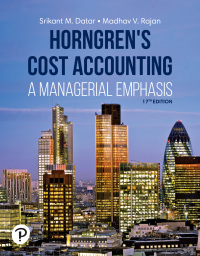Estancia, Inc. is a large company that owns restaurants and has a wine division and a frozen
Question:
Estancia, Inc. is a large company that owns restaurants and has a wine division and a frozen food division. Management of the company gives its division managers autonomy in running their divisions for both operating and investment decisions. Estancia is considering how it should compensate Mr. Jim Beam, the general manager of the frozen food division.
■ Proposal 1 calls for paying Beam a fixed salary.
■ Proposal 2 calls for paying Beam no salary and compensating him only on the basis of the division’s RI, calculated based on operating income before any bonus payments.
■ Proposal 3 calls for paying Beam some salary and some bonus based on RI.
Required
1. Evaluate the three proposals, specifying the advantages and disadvantages of each.
2. Estancia competes against Starship Industries in the frozen food business. Starship is approximately the same size as Estancia’s frozen food division and operates in a similar business environment.
Top management of Estancia is considering evaluating Beam on the basis of his division’s RI minus Starship’s RI. Of course, Beam complains that this approach is unfair because the performance of another company, over which he has no control, is included in his performance evaluation measure. Is Beam’s complaint valid? Why or why not?
3. Now suppose that Beam has no authority for making capital-investment decisions. Corporate management makes these decisions. Is RI a good performance measure to use to evaluate Beam? Is RI a good measure to evaluate the economic viability of the frozen food division? Explain.
4. The salespeople for the frozen food division of Estancia, Inc. are responsible for selling and for providing customer service and support. Sales are easy to measure. Although customer service is important to the frozen food division in the long run, the division has not yet implemented customerservice measures. Beam wants to compensate his sales force only on the basis of sales commissions paid for each unit of product sold. He cites two advantages to this plan:
a. It creates strong incentives for the sales force to work hard.
b. The company pays salespeople only when the company itself is earning revenues.
Do you agree with this plan? Why or why not?
Step by Step Answer:

Horngrens Cost Accounting A Managerial Emphasis
ISBN: 9780135628478
17th Edition
Authors: Srikant M. Datar, Madhav V. Rajan





